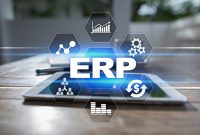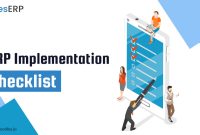In today’s ever-evolving business environment, companies are on a constant mission to streamline their processes and maintain a competitive edge. A transformative solution that has significantly impacted business operations is the Enterprise Resource Planning (ERP) software. An ERP program is an all-inclusive platform that merges a company’s essential business operations, such as finance, human resources, inventory management, and supply chain optimization.
Integrating an ERP program within a business framework unlocks extensive advantages. From boosting efficiency and productivity to empowering informed decision-making based on real-time data, this groundbreaking technology paves the way for businesses to enhance workflow management and resource allocation, ultimately fostering growth and profitability.
Key Highlights
- An ERP program integrates critical business functions including finance, HR, inventory management, and supply chain optimization.
- Implementing an ERP program can significantly enhance efficiency, improve workflows, and optimize resource management.
- ERP systems enable businesses to leverage data for strategic growth and profitability.
- ERP solutions help enterprises attain a market advantage by streamlining their operations.
- These programs offer a centralized platform to manage various business processes, thus enhancing control and visibility.
The Profound Impact of an ERP Program
An Enterprise Resource Planning (ERP) program is a sophisticated software system designed to unify an organization’s various departments and their respective functions into a single coherent platform. This robust tool facilitates seamless data flow and grants real-time access to crucial information across the business, promoting superior operations and organizational growth.
Defining an ERP Program
Essentially, an ERP program aggregates various business processes, such as financial management, human resources, supply chain management, and customer relationship management, within one integrated platform. By amalgamating these diverse systems, an ERP program aids organizations in managing and optimizing their resources, information, and operations more efficiently.
Advantages of Embracing an ERP Program
Incorporating an ERP program heralds a plethora of benefits, which include:
- Enhanced process automation leading to smoother operations.
- Superior data integration, which allows for real-time access to vital information.
- More streamlined financial management and accounting.
- Improved human resources management enhancing overall productivity.
| Feature | Benefit |
|---|---|
| Process Automation | Automates repetitive business tasks, thereby boosting efficiency and lowering error risks. |
| Data Integration | Cohesively integrates data from multiple departments into a centralized system, facilitating real-time access to critical data. |
| Financial Management | Enhances financial functions including reporting and budgeting for improved visibility and control. |
| Human Resources Management | Streamlines HR tasks like payroll, employee records, and performance management, thus boosting productivity. |
Core Features of an ERP Program
An Enterprise Resource Planning (ERP) program can revolutionize the functioning of businesses. It houses a suite of features specifically designed to enhance different facets of business operations. Here we will explore some of these key elements.
Inventory Management
Managing inventory has never been easier, thanks to the capabilities of an ERP program. These systems monitor real-time stock levels, supervise supply chains, and automate refill processes so businesses can sustain optimal inventory levels, consequently reducing waste.
Optimizing the Supply Chain
ERP programs significantly enhance supply chain management. These platforms consolidate data from various checkpoints, offering crucial insights into supply chain efficiency which permit data-informed decision making and ensuring smooth logistic operations.
Financial Accounting
Financial accounting is central to an ERP program’s feature set. Using this, companies can aggregate their financial data into a centralized hub, simplifying their billing and invoicing processes, and generating comprehensive reports to aid effective financial management.
Customer Relationship Management (CRM)
Incorporating a CRM module showcases the collaborative power of an ERP system. This aspect helps in managing customer data, personalizing interaction, and enhancing the overall customer experience, which in turn promotes stronger customer loyalty and sales enhancement.
With such robust features built into one platform, an ERP program bestows businesses a comprehensive view of operations, enabling smart, data-driven decisions to enhance efficiency and promote sustainable growth. Whether it’s improving inventory management, supply chain optimization, or enhancing customer relationship management, an ERP program serves as an invaluable tool in an enterprise’s workflow improvement and goal achievement toolkit.
Conclusion
Summing up, an ERP program is a groundbreaking asset for businesses aiming to streamline their processes, advance efficiency, and push the growth needle forward. By centralizing key business functions within an ERP software system, organizations gain real-time data visibility, processes automation, and strategic decision-making prowess to stay ahead in competitive landscapes. Continuous business evolution highlights investing in an ERP program as a strategic catalyst that enhances organizational adaptability and flexibility against continuous market fluctuations.
The extensive benefits of ERP program adoption cover increased productivity, cost efficiency, exceptional customer service, and austere inventory management. As enterprise resource planning gains traction in industry-specific best practices, aligning ERP adoption with core business activities certainly pushes boundaries in enhancing informed decisions through consolidated data management.
Ultimately, initiating an ERP program has transformative impacts underlined by optimized workflows, transparency elevation, and unveiling hidden growth opportunities. As the hunger for efficient, data-liability business software crescendos, ERP solutions are emerging as quintessential components in fortifying enterprise strategy.


